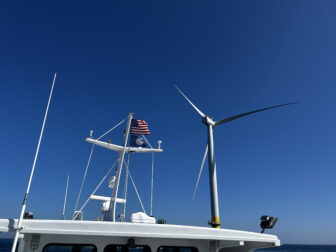Hey All,
For those of you wonky attorneys out there, my article below got published in the June edition of the Maryland Bar Association Newsletter/Journal. Climate Change law is an ever growing and expanding field, especially in Maryland where a slew of bills were passed or are being seriously considered in the Maryland General Assembly addressing global warming and its affects on the Bay. This dynamic field of law is changing so quickly that the article below from June is somewhat outdated. Comments, questions? Please post to our blog :)
Sincerely, CCAN’s lawyer (yes we have a lawyer) Diana Dascalu-Joffe, Esq.
Article for Maryland State Bar Association Environmental Edition
Global Warming and the Law in Maryland
By Diana Dascalu-Joffe
May 2007
Artic ice melting at an alarming rate. Sea level rise. Ravaging forest fires. Strange, destructive weather patterns. Global warming. Anyone who has not heard about global warming or its affect on the world must have been hibernating under a rock for the past few years. The daunting news is everywhere from Vanity Fair to the Wall Street Journal to local community newsletters.
Speaking as an attorney for a Maryland non-profit organization that educates on climate change and its affects on the Chesapeake Bay, business has never been better! Finally, the world, and many citizens, legislators, businesses, faith leaders, etc have had their “eureka” moment on this issue.
Maryland in particular has taken enormous strides in the past three years to address the state’s climate footprint through progressive laws that begin to tackle climate change from the ground up.
Global climate change is the most significant and challenging environmental, social and economic problem of our time. The effects of climate change on our nation in the past decade are staggering with obvious devastation occurring all over the United States. 2005 surpassed 1998 as the warmest year on record [1]. This drastic climate change has lead to severe and destructive weather patterns all across the world and particularly in our own backyard. The effects of global warming are occurring quickly, intensely and are now becoming significantly more evident. In a study released by NASA and published in the April edition of the peer-reviewed journal Climate, scientists predict summers as early as the 2080s in the Eastern US to have daily high temperatures around 10 degrees warmer than recent years. This would mean that many cities in the east would regularly experience temperatures in the 90s on a daily basis, rather than the 80s that are currently the norm. In the 2080s, the average summer high will probably be 102 degrees in Jacksonville, 100 degrees in Memphis, 96 degrees in Atlanta, and 91 degrees in Chicago, Baltimore and Washington, DC, according to the study. These changes will happen largely in our children’s lifetime. With this looming threat, we must address the factors that contribute to climate change aggressively and without apology.
The United States stands virtually alone in the world by refusing to commit to cut greenhouse gas emissions that cause global warming. Our country has no national plan to deal with the growing impacts from global warming on our nation. Therefore, it is by virtue of the states and localities across America that movement in the direction of halting greenhouse gas emissions is taking place.
Maryland has begun to do its part. In 2004, the state passed progressive clean energy standards and joined only a handful of states in mandating the use of clean energy by utilities. The law is called a state renewable portfolio standard and this year, the Maryland legislature passed an addition to that law that would ensure development of solar energy across the state.
In 2006, the Maryland legislature passed the Healthy Air Act. The Healthy Air Act required significant caps on pollution coming directly from power plants. The legislation focused on “criteria” Clean Air Act pollutants such as nitrous oxide, sulfur dioxide, mercury and for the first time in history, carbon dioxide (the most significant greenhouse gas responsible for global warming). The legislation required that the Governor of Maryland sign the state onto the Regional Greenhouse Gas Initiative (RGGI), the first mid-Atlantic state to join the Northeast states’ initiative to curb global warming pollution from power plants. Governor O’Malley committed to this initiative and signed RGGI in April of this year.
With the significant accomplishment of the Healthy Air Act behind them, advocates pushed for the next solution in the global warming “tool box”. The Maryland Clean Cars Bill was introduced in the legislative session in 2007. The bill would add Maryland to 12 other progressive states that adopted California standards for emissions from cars. Under the Clean Air Act, states have a choice between a boilerplate Federal standard for car emissions and a heightened California standard. The Maryland legislature passed the Clean Cars bill with overwhelming support in April and Governor O’Malley signed it into law that same month.
Federal regulation of greenhouse gas emissions from cars was the topic of controversy in the first global warming case before the Supreme Court this year, Massachusetts v. EPA. The Supreme Court (in a split 5 to 4 decision) held that the Environmental Protection Agency DOES have the authority to regulate greenhouse gas emissions from cars and SHOULD regulate this pollutant as a part of their delineated regulatory authority under the Clean Air Act. The Supreme Court justices have seen an Inconvenient Truth!
Finally, the introduction of one of the most direct measures to address global warming, the Maryland Global Warming Solutions Act (or more commonly known as California’s AB 32 bill) shook up the Maryland legislature this year. The bill would place an economy wide cap on greenhouse gas emissions from all sectors, not just power plants. The initial target is to reduce greenhouse gas emissions in Maryland to 1990 levels by 2020. That is equivalent to about a 25% reduction with the long term goal of an 80% reduction in greenhouse gas pollution by 2050. The bill was introduced in February and was unfortunately killed before the end of the session. However, it is clear that next year, Maryland may very well become one in only a handful of states to pass across-the-board global warming pollution reduction legislation.
Overall, Maryland has led the region in combating global warming pollution on all fronts. On the litigation front, new initiatives to fight proposed coal-fired power plants legally are sprouting up all over the country as well. Community advocates and attorneys are joining forces to address the single greatest environmental threat to our world. States, like
Maryland, have sent a clear message to Congress. If you don’t act, we will.
As attorneys, no matter what field we are in, we must look out for the best interests of our clients. Global warming will have its affects on many different types of clients as the years progress, from the insurance industry to the international corporate conglomerate to the homeowner on the disappearing Eastern Shore. The future of global warming and its affects on current energy and environmental law is unclear, but one thing is certain. Climate change is happening and its going to take development and implementation of aggressive laws to address the dangerous and somewhat unanticipated future impacts on Maryland, the nation and the world. Buckle your seat belts





